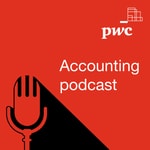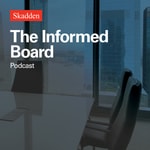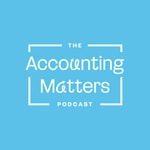PwC's accounting podcast – Détails, épisodes et analyse
Détails du podcast
Informations techniques et générales issues du flux RSS du podcast.

PwC's accounting podcast
PwC
Fréquence : 1 épisode/6j. Total Éps: 291

Listen in as PwC specialists discuss today’s most compelling accounting, reporting, and business issues. Whether financial reporting or sustainability reporting, each episode is packed with insights you won't find anywhere else.
Classements récents
Dernières positions dans les classements Apple Podcasts et Spotify.
Apple Podcasts
🇨🇦 Canada - businessNews
28/07/2025#80🇬🇧 Grande Bretagne - businessNews
28/07/2025#15🇩🇪 Allemagne - businessNews
28/07/2025#32🇺🇸 États-Unis - businessNews
28/07/2025#52🇨🇦 Canada - businessNews
27/07/2025#41🇬🇧 Grande Bretagne - businessNews
27/07/2025#26🇩🇪 Allemagne - businessNews
27/07/2025#49🇺🇸 États-Unis - businessNews
27/07/2025#50🇨🇦 Canada - businessNews
26/07/2025#43🇬🇧 Grande Bretagne - businessNews
26/07/2025#19
Spotify
Aucun classement récent disponible
Liens partagés entre épisodes et podcasts
Liens présents dans les descriptions d'épisodes et autres podcasts les utilisant également.
See all- https://www.linkedin.com/in/heather-horn/
248 partages
- https://www.linkedin.com/in/jayseliber/
27 partages
Qualité et score du flux RSS
Évaluation technique de la qualité et de la structure du flux RSS.
See allScore global : 42%
Historique des publications
Répartition mensuelle des publications d'épisodes au fil des années.
Stock-based compensation - 5 things to know about modifications
mardi 3 septembre 2024 • Durée 27:50
We kick off our miniseries on stock-based compensation with a focus on 5 important things to know when accounting for modifications to stock-based compensation awards.
In this episode, we discuss:
- 2:40 – How to determine whether a change in terms or conditions should be accounted for as a modification
- 5:00 – The stock-based compensation modification framework
- 8:29 – Four types of modifications related to vesting conditions
- 18:39 – Modifications that change classification
- 22:15 – Modifications of performance conditions
For more information, see chapter 4 of our Stock-based compensation guide. Additionally, follow this podcast on your favorite podcast app for more episodes.
Ken Stoler is a partner in PwC’s National Office who specializes in financial reporting and plan design issues related to equity compensation arrangements, retirement and healthcare plans, and other benefits. He has helped companies navigate their employee compensation issues during IPOs, spin offs, acquisitions, and other major transactions or events.
Heather Horn is the PwC National Office Sustainability & Thought Leader, responsible for developing our communications strategy and conveying firm positions on accounting, financial reporting, and sustainability matters. In addition, she is part of PwC’s global sustainability leadership team, developing interpretive guidance and consulting with companies as they transition from voluntary to mandatory sustainability reporting. She is also the engaging host of PwC’s quarterly webcast series.
Transcripts available upon request for individuals who may need a disability-related accommodation. Please send requests to [email protected].
Did you enjoy this episode? Text us your thoughts and be sure to include the episode name.
Accounting for internal-use software costs
mardi 27 août 2024 • Durée 35:53
We continue our miniseries on software costs. They are accounted for using two different models depending on whether the software is used internally or externally. In this episode, we discuss the internal-use model applicable to software developed or obtained to meet the reporting entities’ internal needs.
In this episode, we discuss:
- 3:24 – The scope of internal-use software
- 10:29 – The three stages of software development
- 14:07 – Cloud computing arrangements
- 17:50 – Practical challenges in applying this model
- 25:05 – An overview and update on the FASB's current software costs project
For more information, see chapter 3 of our Software costs guide. Also, check out our other episode in this miniseries, Accounting for the cost of externally marketed software. Additionally, follow this podcast on your favorite podcast app for more episodes.
Mike Coleman is a partner in PwC's National Office who specializes in accounting for revenue and software arrangements and has served technology clients for much of his career. In addition, Mike has represented the firm on the AICPA Software Task Force.
Pat Durbin is a Deputy Chief Accountant in PwC’s National Office. He has over 30 years of experience consulting with our clients and engagement teams on complex accounting matters, including issues related to revenue, compensation, income taxes, and inventory under both US GAAP and IFRS.
Heather Horn is the PwC National Office Sustainability & Thought Leader, responsible for developing our communications strategy and conveying firm positions on accounting, financial reporting, and sustainability matters. In addition, she is part of PwC’s global sustainability leadership team, developing interpretive guidance and consulting with companies as they transition from voluntary to mandatory sustainability reporting. She is also the engaging host of PwC’s quarterly webcast series.
Transcripts available upon request for individuals who may need a disability-related accommodation. Please send requests to [email protected].
Did you enjoy this episode? Text us your thoughts and be sure to include the episode name.
Identifying the contract – The first step in recognizing revenue
mardi 16 juillet 2024 • Durée 41:11
Our revenue miniseries continues with identifying the contract, the first step in the five-step model in the revenue standard. It's important to get this step right to appropriately apply the model for recognizing revenue.
In this episode, we discuss:
- 4:10 – The five criteria to have a contract with a customer under the revenue standard
- 8:23 – The impact of master services agreements and enforceable rights
- 16:03 – Assessing collectibility of the consideration in the contract
- 27:08 – Determining the contract term
For more information, read chapter 2 of our Revenue guide. Also, to hear more on revenue topics, listen to the first episode in this miniseries, Gross versus net revenue: Is your company the principal or agent?. Additionally, follow this podcast on your favorite podcast app for more episodes.
Mike Coleman is a partner in PwC's National Office with over 30 years of experience. Mike specializes in accounting for revenue and software arrangements and has served technology clients for much of his career. In addition, Mike has represented the firm on the AICPA Software Task Force.
Pat Durbin is a Deputy Chief Accountant in PwC’s National Office. He has over 30 years of experience consulting with our clients and engagement teams on complex accounting matters, including issues related to revenue, compensation, income taxes, and inventory under both US GAAP and IFRS.
Heather Horn is the PwC National Office Sustainability & Thought Leader, responsible for developing our communications strategy and conveying firm positions on accounting, financial reporting, and sustainability matters. In addition, she is part of PwC’s global sustainability leadership team, developing interpretive guidance and consulting with companies as they transition from voluntary to mandatory sustainability reporting. She is also the engaging host of PwC’s quarterly webcast series.
Transcripts available upon request for individuals who may need a disability-related accommodation. Please send requests to [email protected].
Did you enjoy this episode? Text us your thoughts and be sure to include the episode name.
Talking ESG: Accounting for IRA tax credits
jeudi 14 septembre 2023 • Durée 01:00:31
In today’s episode, sustainability and financial reporting intersect. We discuss accounting for green incentives that arise from the Inflation Reduction Act (IRA). The IRA, signed into law in August 2022, provides climate and clean energy tax credits.
With many types of credits available in the IRA, companies have raised questions about the financial accounting implications of the credits given the unique features that these credits have compared to past federal incentives. This week, Heather Horn is joined by Pat Durbin, a Deputy Chief Accountant in PwC’s National Office, and Jillian Pearce, a partner in our utilities practice, both of whom have closely followed accounting for the credits, to discuss what to look out for in accounting for IRA tax credits.
In this episode, you’ll hear discussion of:
- 2:38 - The background, including the breadth, scope, and structure of available IRA credits
- 7:45 - The different pathways to realization of tax credits
- 11:45 - How companies should allocate consideration paid for IRA credits
- 17:07 - The difference between renewable energy credits (RECs) and IRA credits
- 24:32 - Accounting for tax credits by analogy to IAS 20, Accounting for Government Grants and Disclosure of Government Assistance
- 43:16 - Accounting for tax credits using under the ASC 740, Income Taxes, model
- 56:44 - Tax credit disclosure and control considerations
Looking for more information on accounting for IRA energy incentives? Check out our latest publication on IRA credits. Additionally, check out our podcast episode on renewable energy credits for more information.
Pat Durbin is a Deputy Chief Accountant in PwC’s National Office. He has over 30 years of experience consulting with our clients and engagement teams on complex accounting matters, including issues related to revenue, compensation, income taxes, and inventory under both US GAAP and IFRS.
Jillian Pearce is a partner in PwC's National Office, providing advice on financial instruments and other technical accounting issues to power and utilities clients. She was a Professional Accounting Fellow in the Office of the Chief Accountant at the SEC, and has over 15 years of auditing experience.
Heather Horn is PwC’s National Office thought leader, responsible for developing our communications strategy and conveying firm positions on accounting and financial reporting matters. She is the engaging host of PwC’s accounting and reporting weekly podcast and quarterly webcast series. With over 30 years of experience, Heather’s accounting and auditing expertise includes financial instruments and rate-regulated accounting.
Transcripts available upon request for individuals who may need a disability-related accommodation. Please send requests to [email protected].
Did you enjoy this episode? Text us your thoughts and be sure to include the episode name.
Earnings per share: 5 things you need to know
mardi 29 août 2023 • Durée 24:49
Every Tuesday in August, Bret Dooley, Deputy Chief Accountant in PwC’s National office, is taking over the podcast to share insights on financial instruments hot topics. In each 25-minute episode, Bret will discuss 5 things you need to know.
In this episode, Bret is joined by John Horan, a managing director in PwC’s National office with a focus on financial instruments, to break down what we need to know on earnings per share (EPS).
In this episode, you’ll hear:
- 2:20 - Reminders on the basic EPS calculation, including considerations for participating securities and application of the the two-class method
- 11:45 - The impact of mezzanine equity on the basic EPS calculation
- 15:12 - The impact of new FASB guidance (ASU 2020-06) on EPS calculations for contracts that can be settled in cash or shares
- 20:01 - Complexities in the dilution calculation for liability-classified warrants and convertible debt with bifurcated conversion options
- 21:48 - Why companies should evaluate repurchased convertible instruments separately
For more information, read chapter 7 of our Financial statement presentation guide. Additionally, check out a prior podcast in this mini series.
John Horan is a managing director in PwC’s National office where he assists clients with complex accounting issues in the areas of foreign currency, liabilities and equity, earnings per share, and derivatives and hedging. John specializes in large capital transactions and initial public offerings.
Bret Dooley is a Deputy Chief Accountant in PwC’s National office who leads teams focused on the financial services sectors and accounting for financial instruments. He has over 25 years of experience in the financial services, banking, and capital markets industries. Bret focuses on emerging financial reporting issues related to financial instruments, developing interpretive guidance, and assisting clients in resolving complex accounting matters.
Heather Horn is PwC’s National office thought leader, responsible for developing our communications strategy and conveying firm positions on accounting and financial reporting matters. She is the engaging host of PwC’s accounting and reporting weekly podcast and quarterly webcast series. With over 30 years of experience, Heather’s accounting and auditing expertise includes financial instruments and rate-regulated accounting.
Transcripts available upon request for individuals who may need a disability-related accommodation. Please send requests to [email protected].
Did you enjoy this episode? Text us your thoughts and be sure to include the episode name.
Convertible instruments: 5 things you need to know
mardi 22 août 2023 • Durée 24:50
Every Tuesday in August, Bret Dooley, Deputy Chief Accountant in PwC’s National office, is taking over the podcast to share insights on financial instruments hot topics. In each 25-minute episode, Bret will discuss 5 things you need to know.
In this episode, Bret is joined by Chip Currie, another partner in PwC’s National office with a focus on financial instruments, to discuss convertible instruments and the impacts of updated accounting guidance in this area.
In this episode, you’ll hear discussion of:
- 1:38 - Why companies use convertible instruments and the complex financial decisions accompanying their use
- 6:38 - The impact of new accounting guidance for convertible instruments in ASU 2020-06
- 9:49 - Key information when accounting for induced conversions
- 12:10 - Down round provisions in equity-linked instruments
- 19:27 - Judgments involved in determining whether to separate the conversion option and account for it as an embedded derivative
For more information, read chapter 6 of our Financing transactions guide and chapter 3 of our Derivatives and hedging guide. Additionally, check out a prior podcast in this mini series.
Chip Currie is a partner in PwC’s National office with over 25 years of experience assisting companies in resolving complex business and accounting issues. He concentrates on the accounting for financial instruments under both current and emerging standards and works with many of the firm's largest financial services clients and a number of non-financial services clients on treasury-related matters.
Bret Dooley is a Deputy Chief Accountant in PwC’s National office who leads teams focused on the financial services sectors and accounting for financial instruments. He has over 25 years of experience in the financial services, banking, and capital markets industries. Bret focuses on emerging financial reporting issues related to financial instruments, developing interpretive guidance, and assisting clients in resolving complex accounting matters.
Heather Horn is PwC’s National office thought leader, responsible for developing our communications strategy and conveying firm positions on accounting and financial reporting matters. She is the engaging host of PwC’s accounting and reporting weekly podcast and quarterly webcast series. With over 30 years of experience, Heather’s accounting and auditing expertise includes financial instruments and rate-regulated accounting.
Transcripts available upon request for individuals who may need a disability-related accommodation. Please send requests to [email protected].
Did you enjoy this episode? Text us your thoughts and be sure to include the episode name.
CECL: 5 things you need to know about credit risk
mardi 15 août 2023 • Durée 26:49
Every Tuesday in August, Bret Dooley, Deputy Chief Accountant in PwC’s National office, is taking over the podcast to share insights on financial instruments hot topics. In each 25-minute episode, Bret will discuss 5 things you need to know.
In this episode, Bret shares insights on the current expected credit loss model, or CECL, and why it’s not just for banks. All companies, regardless of industry, need to understand the requirements.
In this episode, you’ll hear:
- 1:50 - A refresher on CECL
- 3:34 - Insights on the impacts of CECL across industries
- 7:03 - A discussion of how to apply CECL to various asset classes, considerations on estimation methodologies, and why companies should seek continuous improvement in the application of CECL
- 9:32 - Key information to consider when preparing CECL disclosures
- 11:22 - How subsequent events could impact CECL estimates
- 20:43 - An overview of the FASB’s exposure draft that proposes changes to the accounting for purchased credit deteriorated assets
For more information, read chapter 7 of our Loans and investments guide. Additionally, check out the prior podcast in this mini series.
Bret Dooley is a Deputy Chief Accountant in PwC’s National office and leads teams focused on the financial services sectors and accounting for financial instruments. He has over 25 years of experience in the financial services, banking, and capital markets industries. Bret focuses on emerging financial reporting issues related to financial instruments, developing interpretive guidance, and assisting clients in resolving complex accounting matters.
Heather Horn is PwC’s National office thought leader, responsible for developing our communications strategy and conveying firm positions on accounting and financial reporting matters. She is the engaging host of PwC’s accounting and reporting weekly podcast and quarterly webcast series. With over 30 years of experience, Heather’s accounting and auditing expertise includes financial instruments and rate-regulated accounting.
Transcripts available upon request for individuals who may need a disability-related accommodation. Please send requests to [email protected].
Did you enjoy this episode? Text us your thoughts and be sure to include the episode name.
Investment securities: 5 things you need to know
mardi 8 août 2023 • Durée 30:21
Every Tuesday in August, Bret Dooley is taking over the podcast to share insights on financial instruments hot topics. In each episode, Bret will discuss 5 things you need to know in 25 minutes.
To kick off the series, Bret shares insights on accounting for investment securities, a topic of recent headlines. He breaks down the complexities of held-to-maturity and available-for-sale securities, and touches on foreign currency bonds.
In this episode, you’ll hear discussion of:
- 2:05 - Key reminders for identifying and accounting for debt securities
- 6:32 - Accounting for held-to-maturity (HTM) securities and the long-term implications of HTM designation
- 12:30 - Tips on accounting for unrealized losses on available-for-sale (AFS) securities
- 17:18 - An overview of accounting for foreign currency bonds
- 19:25 - Complexities in the application of the measurement alternative model for equity securities
For more information, read chapters 2, 3, and 8 of our Loans and investments guide.
Bret Dooley is a Deputy Chief Accountant in PwC’s National office and leads teams focused on the financial services sectors and accounting for financial instruments. He has over 25 years of experience in the financial services, banking, and capital markets industries. Bret focuses on emerging financial reporting issues related to financial instruments, developing interpretive guidance, and assisting clients in resolving complex accounting matters.
Heather Horn is PwC’s National office thought leader, responsible for developing our communications strategy and conveying firm positions on accounting and financial reporting matters. She is the engaging host of PwC’s accounting and reporting weekly podcast and quarterly webcast series. With over 30 years of experience, Heather’s accounting and auditing expertise includes financial instruments and rate-regulated accounting.
Transcripts available upon request for individuals who may need a disability-related accommodation. Please send requests to [email protected].
Did you enjoy this episode? Text us your thoughts and be sure to include the episode name.
Navigating SEC filing requirements for a business combination
mardi 1 août 2023 • Durée 56:20
Every Tuesday in July, Jay Seliber is taking over the podcast to share insights on business combinations, which are often significant events in a company’s life cycle. Jay takes us on a journey through a deal, beginning with the complexities of the overall acquisition accounting model, then diving into some of the more complex areas—identifying the accounting acquirer, accounting for contingent consideration, and reporting with the SEC.
To continue the series, Heather and Jay are joined by Ryan Spencer, a PwC National office partner who specializes in SEC reporting, to break down the SEC filing requirements for business combinations, including the application of significance tests used to determine the reporting requirements.
In this episode, you’ll hear:
- 2:02 - A breakdown of the SEC filing requirements for business combinations
- 7:10 - A discussion of significance tests and how they help to determine filing requirements
- 17:36 - A summary of financial statement requirements, including considerations on timing and the age of financial information
- 23:38 - An overview of the unique guidelines for a company filing (1) a new registration statement, (2) transactional proxy statements, and (3) reverse-merger information
- 32:30 - A summary of pro forma reporting requirements, including timing considerations
- 43:36 - The distinction between the SEC and US GAAP disclosure requirements
- 47:06 - Final advice for companies navigating the filing requirements for a business combination
For more information, read chapter 17 of our Financial statement presentation guide and the SEC Financial Reporting Manual. Also check out the prior podcast in this miniseries on business combinations.
Jay Seliber is a partner in PwC’s National office. He leverages over 30 years of experience to help clients with their most complex accounting matters, particularly in the areas of mergers and acquisitions, revenue recognition, stock compensation, earnings per share, employee benefits, restructurings, impairments, and financing transactions. Jay is presently PwC's representative on the FASB's Emerging Issues Task Force.
Ryan Spencer is a partner at PwC's National office specializing in SEC financial reporting. He has over 20 years of experience serving clients and is a frequent contributor to PwC’s publications and communications.
Heather Horn is PwC’s National office thought leader, responsible for developing our communications strategy and conveying firm positions on accounting and financial reporting matters. She is the engaging host of PwC’s accounting and reporting weekly podcast and quarterly webcast series. With over 30 years of experience, Heather’s accounting and auditing expertise includes financial instruments and rate-regulated accounting.
Transcripts available upon request for individuals who may need a disability-related accommodation. Please send requests to [email protected].
Did you enjoy this episode? Text us your thoughts and be sure to include the episode name.
Becoming nature positive: Integrating strategy and reporting
jeudi 11 juillet 2024 • Durée 33:43
Host Heather Horn welcomes back Will Evison, a director in PwC UK’s Global Sustainability, Climate, and Nature Strategy practice, to provide an update on the work of PwC’s Centre for Nature Positive Business and discuss the relationship between nature positive business strategy and reporting.
In this episode, they discuss:
- 2:18– The purpose and progress of PwC’s Centre for Nature Positive Business
- 8:57 – The impact of the Corporate Sustainability Reporting Directive adoption on company strategies
- 10:45 – The importance of nature positive business
- 12:58 – Nature reporting developments, including those related to the European Sustainability Reporting Standards and the Task Force on Nature Related Financial Disclosures (TNFD)
- 23:27 – Insights on how companies can combine nature strategy and reporting
- 28:55 – What’s on the horizon for nature positive business
Interested in more background on measuring and reporting nature and biodiversity? Listen to our previous podcasts in the “Becoming nature positive” series (Committing, measuring and reporting and Strategizing and implementing) and check out PwC’s global nature hub here.
Also, referenced in the podcast, is the Nature Strategy Handbook developed by Business for Nature in collaboration with PwC UK (official partner of the campaign), as well as Managing natures risks: from understanding to action, a follow-up to an earlier analysis of the nature dependence of industries’ direct operations that was carried out by PwC as part of the World Economic Forum’s New Nature Economy Report Series and published in the Nature Risk Rising report in 2020.
Will Evison is a director in PwC UK’s Global Sustainability, Climate, and Nature Strategy practice, specializing in integrating natural and social capital analysis into decision making. With over 18 years’ experience delivering climate and nature-related projects with businesses, investment firms and public sector organizations across more than 20 countries, he also led the development of PwC’s Total Impact Measurement and Management methodologies (TIMM), and now manages PwC’s global TIMM center of excellence. These methodologies utilize predictive analytics, health economics, and wellbeing techniques to model outcomes.
Heather Horn is the PwC National Office Sustainability & Thought Leader, responsible for developing our communications strategy and conveying firm positions on accounting, financial reporting, and sustainability matters. In addition, she is part of PwC’s global sustainability leadership team, developing interpretive guidance and consulting with companies as they transition from voluntary to mandatory sustainability reporting. She is also the engaging host of PwC’s quarterly webcast series.
Transcripts available upon request for individuals who may need a disability-related accommodation. Please send requests to [email protected].
Did you enjoy this episode? Text us your thoughts and be sure to include the episode name.









